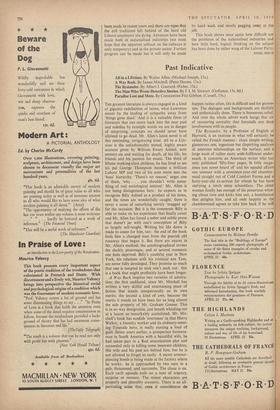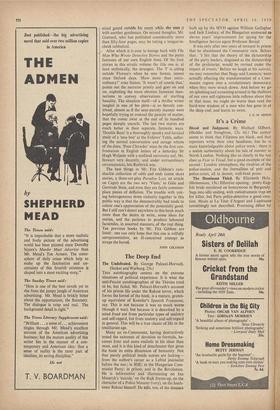Past Indicative
All in a Lifetime. By Walter Allen. (Michael Joseph, 15s.) A Way Back. By James Mitchell. (Peter Davies, 15s.) The Bystander. By Albert J. Guerard. (Faber, 15s.) The Man Who Wrote Detective Stories. By J. I. M. Stewart. (Gollancz, 13s. 6d.) Paradise Lost and More. By Constantine Fitz Gibbon. (Cassell, 15s.)
THE greatest literature is always engaged in a kind of gigantic redefinition of terms, what Lawrence meant by the leading of sympathy away from `things gone dead.' And it is a valuable form of literature that can move back into the near past and redefine by example words we are in danger of mjsprising, concepts we should never have allowed to go dead. Mr. Allen's latest novel is of this reminding, invigorating kind. All in a Life- time is the unfashionably muted, highly aware account given by William Ewart Ashted, now seventy-six and waiting for death, of his life, his friends and his passion for music. The third of fifteen working-class children, he has lived to see his, pal George Thompson become a brilliant Labour MP and two of his sons move into the `boss' hierarchy. 'There's no reason,' urges one of them, 'why . . . you shouldn't write some- thing of real sociological interest.' Mr. Allen is not being disingenuous here: he expects us to recognise Billy Ashted as a product of his times, and the times are wonderfully caught; there is never a sense of something merely 'mugged up' for the occasion. But it is the comments Billy is able to make on his experience that finally count and Mr. Allen has found a sober and subtle prose that doesn't jar with one's conception of Billy as largely self-taught. Writing his life down is made to count for him, too : the end of the book finds him a changed man from the peevish old runaway that began it. But there are snares in Mr. Allen's method; the autobiographical invites the slackly picaresque, and at several moments one feels deprived. Billy's youthful year in New York, his relations with his criminal son Tom, are never fully developed. They Promise so much that one is tempted to stick one's neck out : this is a book that might profitably have been longer.
A Way Back inspires two varieties of admira- tion; the first undiluted, since Mr. Mitchell has written a very skilful and entertaining piece of fiction that stands unequivocally on its own merits; the second a kind of awe, because the merits it stands on have been for so long almost the sole property of Mr. Graham Greene. This is in no way denigration, just breath whistling out at a lesson so remarkably assimilated. Mr. Mit- chell's book has modish 'overtones' in that Harry Walker, a foundry worker and its ordinary-seem- ing Tyneside hero, is really nursing a load of guilt. Seven years earlier, a prosperous business- man in South America with a beautiful wife, he had taken part in a Red assassination plot and succeeded only in killing some innocent children. His wife and his past are behind him, but he is not allowed to forget so,easily. A secret armour- piercing bomb is being made at the factory where he works: he is approached by two men in a pub, threatened, and succumbs. The chase is on. Each swift episode ends on a note of urgency, surprise or menace. The minor characters are properly and plausibly eccentric. There is an all- pervading sense that, even if coincidences do
happen rather often, life is difficult and for grown- ups. The dialogue and backgrounds are thriftily and authentically done. There is humorous relief. And over the whole adroit work hangs that air of reassuring unreality that forestalls any deep involvement with its people.
The Bystander, by a Professor of English at Harvard, is an exercise in what will certainly be called the French manner : clean simple writing, glamorous sets, ingenious but dispiriting analyses of amorous relationships on the surface, and a large wash of rather nasty wish-fulfilment under- neath. It concerns an American writer who has only published 'fifty-four pages, in little maga- zines you never heard of and his'squalid affairs one summer with a seventeen-year-old chamber- maid straight out of Cold Comfort Ferme and a forty-year-old ex-actress for whom he has been carrying a torch since schooldays. The older woman finally has enough of his penurious whin- ing about love and kicks him out, a humiliation that delights him, and all ends happily as the chambermaid agrees to take him back if he will
stand guard outside his room while she uses it with another gentleman. On second thoughts, Mr. Guerard, who has published considerably more than fifty-four pages, may be taking a tongue-in- cheek sabbatical.
After which it is cosy to lounge back with The Man Who Wrote Detective Stories and the purer fantasies of our own English dons. Of the four stories in this erratic volume the title one is, at least stylistically, the strangest. The 'I' is sitting outside Florian's when he sees Seston, unmet since Oxford days. 'How more than extra- ordinary!' cries Seston. 'It wasn't of course that,' points out the narrator primly and goes on and on, exploiting the more obvious Jamesian man- nerisms to convey observations of startling banality. The situation itself—of a thriller writer tangled in one of his plots—is so fiercely con- trived, almost as if the near-parody manner were hopefully trying to conceal the paucity of matter, that the comic twist at the end of its hundred pages damply uncurls. The last two stories are much better in their separate, fantastic ways. 'Double Buzz' is a thoroughly spooky and farcical study of a 'new boy' at the Fellows' Table, suffer- ing the surreal conversation and savage whims of the dons. 'Poor Chowder' must be the first con- frontation in English letters of a latterday Sir Hugh Walpole with a midland university oaf. Mr. Stewart very decently, and under extraordinary circumstances, lets Redbrick win.
The best things in Mr. Fitz Gibbon's ram- shackle collection of odds and ends (some short stories, a three-actsplay Paradise Lost, an article on Capri) are the two wry 'Visits,' to Gide and Gertrude Stein, and even they are fairly common- place pieces of deflation. The trouble with yok- ing heterogeneous items violently together in this public way is that the demonstrably bad tends to colour one's appreciation of the potentially good. But I still can't detect anywhere in this book much more than the desire to write, some ideas for stories, and the patience to produce laboured facsimiles, in assorted manners, of the real thing. Ten previous books by Mr. Fitz Gibbon are listed : one can only hope that this one is wilfully unrepresentative, an ill-conceived attempt to scrape the barrel.
JOHN COLEMAN















































 Previous page
Previous page